Surgery
At Weardale Vets we offer a wide range of surgical procedures. As well as routine neutering of Dogs, Cats, Rabbits and Ferrets we carry out orthopaedic and soft tissue surgery as well as ophthalmic procedures.
Orthopoaedics
Most fractures can be repaired here using a variety of techniques :-
Pin and Wire - the simplest method where a metal pin or rod is inserted into the hollow centre of the broken bone to hold the fragments together. A steel wire is tied around the outside of the bone to prevent the fragments rotating.
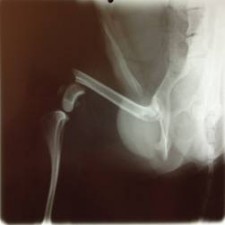 |
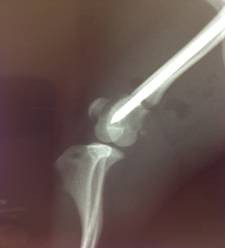 |
External Fixator - this process involves passing pins through the skin into the broken bone fragments perpendicularly and using bars outside of the body to hold the broken bits of bone together.
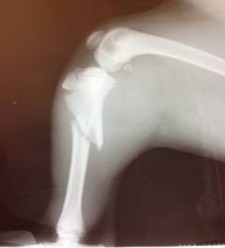 |
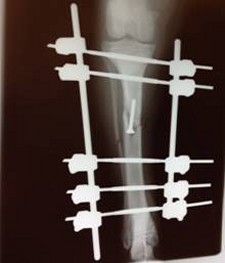 |
Plating - this involves attaching a flat metal plate to the surfaces of the bone with screws. This method is strong and the plates usually stay in for life.
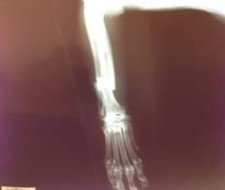 |
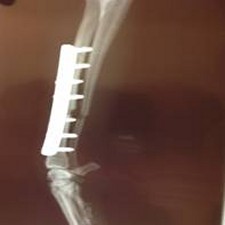 |
Of course some fractures only need a Cast!
The commonest orthopaedic problem we see is rupture of the Cranial Cruciate Ligament in the stifle (knee) . This is similar to the injury suffered by many professional footballers including Gazza and Michael Owen however, in dogs, it’s usually caused by an inherited weakness and not years of kicking footballs and other players!! There are 3 accepted methods of repair the commonest being the placement of a nylon implant to replace the ligament.
Ophthalmic Surgery
Dogs’ eyelids are often turned in (entropion) or out (ectropion). This can lead to problems in time but is easily corrected by removing a small piece of skin above and below the eye
Eyelid tumours are removed by taking a V shaped wedge of eyelid out.
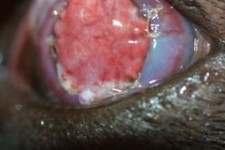 |
Ulcers can develop on the cornea and can be so deep that the eye is in danger of rupturing. These are repaired using a graft. |
Extra eyelashes (ectopic ciliae ) are a nuisance in many breeds particularly small breeds. They can be removed by a technique called cryo epilation which involves freezing the root of the extra eyelashes
Some eyes are so damaged and painful that repair is impossible and removal (enucleation) is necessary. This usually bothers the owner a lot more than the pet!!
Airway Surgery
Dogs with short noses like Pugs, French and English Bulldogs, Cavalier Spaniels and Staffordshire Bull Terriers are frequently bothered by breathing difficulties caused by excessively long soft palates and narrow collapsing nostrils. This is called Brachycephalic Syndrome. This can be associated with frequent vomiting and inability to exercise. Correction by trimming the soft palate and taking a wedge out of the nostrils can bring a marked improvement to their lives.
Ear Surgery
Many ear infections are difficult to treat medically. It’s often necessary to syringe them under general anaesthesia and use ear wicks - cotton implants soaked in strong antibiotics. Some ears can become so damaged or full of polyps - warty lumps of scar tissue - that relief can only be achieved by removing the ear canal surgically. Occasionally even the middle ear needs opened to remove debris or growths.
Abdominal Surgery:-
The commonest abdominal procedures are hysterectomies along with removal of Foreign Bodies from the gut. Dogs eat a surprising number of solid objects - stones, babies’ dummys , socks , tights, rubber balls, golf balls and even fish hooks!!!
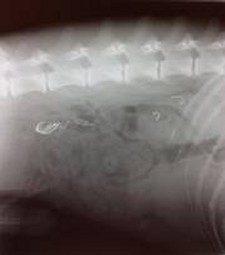 |
This 14 year old dog ate 12 fish hooks with bait on! Luckily they were facing the right way and he passed them without surgery. |
Usually it’s young dogs that do this but we recently took a solid woollen pom-pom out of an eight year old Border Collie.
One individual Springer Spaniel coming here needed surgery on no less than 9 occasions to remove objects of clothing!! Luckily his owner had insured him as a puppy.
(Dogs also frequently get foreign bodies in their toes - typically glass which luckily shows up on Xray)
Another common abdominal operation is removal of bladder stones - usually small dogs like Jack Russell Terriers and Shih Tzus
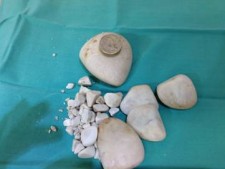 |
These bladder stones came out of one female Border Collie. |
Other common soft tissue procedures are tumour removals, particularly mammary tumours and skin tumours which seem to be becoming more common.
Hernias typically umbilical hernias are a common occurrence but, thankfully, are rarely serious.
Older male dogs can get perineal hernias beside their bottoms which make passing faeces difficult. These are easily repaired.
Anaesthetics and Pain Relief
Whatever surgery your pet comes in for you can be assured that we will always use the most modern anaesthetics and the best painkillers available. Please feel free to ask the Vet anything about the operation or the drugs used. Most animals undergoing surgery will come home with an anti-inflammatory pain killing drug - for example Metacam. Some will also have Tramadol and even oral morphine type drugs. Comforting and TLC also helps a lot!!
Estimates
We can provide detailed estimates of the costs involved in any procedure beforehand. Please ask for one.




